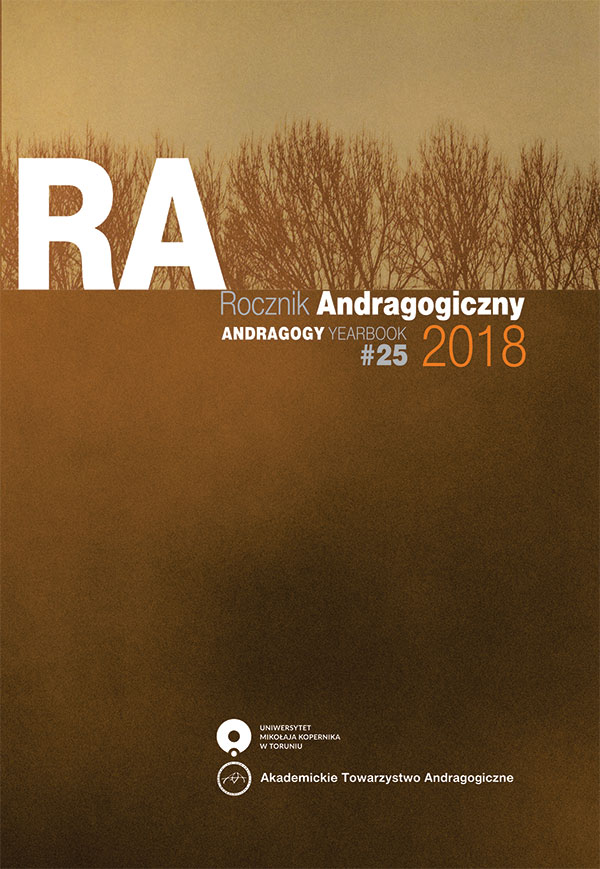A complex systems perspective on developing intercultural communicative competence of teachers of English in autonomy-supportive settings – reflections from a summer school
DOI:
https://doi.org/10.12775/RA.2018.05Keywords
intercultural competence, teacher training, autonomy, complex systems perspectiveAbstract
Although research into foreign language teachers’ intercultural competence has undergone a number of transformations over the last 20 years, one of the least discussed lines of inquiry is that examining the development of intercultural competence in autonomous contexts and/or discussing the results within a unified framework. We point to a potential contribution that complex systems theory can bring to research on the intercultural learning of teachers of English in autonomy-supportive settings from a theoretical perspective. We present data illustrating how different types of autonomy interact dynamically with intercultural competence to produce unexpected results. It is thus postulated that there is a need for a complex systems perspective in interpreting the interplay between autonomy-supportive factors and intercultural competence.
References
Barell J. (1992), Ever Wonder?, Columbus, OH, Zaner-Bloser.
Benson P. (2001), Teaching and Researching Autonomy in Language Learning, Harlow, Longman.
Benson P. (2003), Learner Autonomy in the Classroom, [in:] Nunan, D. (ed.), Practical English Language Teaching, New York, McGraw Hill, pp. 289–308.
Benson P. (2006), Autonomy in Language Teaching and Learning, “Language Teaching”, 40, pp. 21–40.
Byram M. (1997), Teaching and Assessing Intercultural Competence, Clevedon, Multilingual Matters.
Coperías Aguilar M. J. (2010), Intercultural Communicative Competence as a Tool for Autonomous Learning, “Revista Canaria de Estudios Ingleses”, 61, pp. 87–98.
Dai X., Guo-Ming C. (eds.) (2014), Intercultural communication competence: Conceptualization and its development in cultural contexts and interactions, Cambridge, Cambridge Scholars.
Dam L. (2000), Why Focus on Learning rather than Teaching? From Theory to Practice, [in:] Dam L., Little D., Timmer, J. (eds.), Focus on Learning rather than Teaching: Why and How?, Dublin, CLCS, pp. 18–37.
Deardorff D. K. (2008), Intercultural Competence: A Definition, Model, and Implicationsfor Education Abroad, [in:] Savicki V. (ed.), Developing Intercultural Competence and Transformation: Theory, Research, and Application in International Education, Sterling, Virginia, Stylus Publishing, pp. 32–52.
Deardorff D. K. (2011), Promoting understanding and development of intercultural dialogue and peace: A comparative analysis and global perspective of regional studies on intercultural competence, [in:] Report of the State of the Arts and Perspectives on Intercultural Competences and Skills, Paris, UNESCO.
Garrett-Rucks P. (2012), Byram Versus Bennett: Discrepancies in the Assessment of Learners’ IC Development, Paper presented at the Third International Conference on the Development and Assessment of Intercultural Competence, at the University of Arizona, January 26–29.
Larsen-Freeman D. (2000), Techniques and Principles in Language Teaching, 2nd ed., Oxford, Oxford University Press.
Larsen-Freeman D., Cameron L. (2008), Complex Systems and Applied Linguistics, Oxford, Oxford University Press.
Lee L. (2011), Blogging: promoting learner autonomy and intercultural competence through study abroad, “Language Learning & Technology”, 15(3), pp. 87–109.
Little D. (2001), Learner autonomy and the challenge of tandem language learning via the Internet, [in:] Chambers A., Davies G. (eds.), ICT and language learning: A European perspective, Lisse, Swets & Zeitlinger, pp. 29–38.
Little D. (2003), Learner Autonomy and Second/Foreign Language Learning, Subject Centre for Languages, Linguistics and Area Studies Good Practice Guide, available at: http://www.llas.ac.uk/resources/gpg/1409#ref5 (accessed 06.03.2017.).
Littlewood W. (1999), Defining and developing autonomy in East Asia contexts, “Journal of Social Sciences & Humanities of Shiraz University, Applied Linguistics”, 20(1), pp. 71–94.
Matsuo C. (2012), A critique of Michael Byram’s Intercultural Communicative Competence model from the perspective of model type and conceptualization of culture, “Fukuoka University Review of Literature & Humanities”, 44, pp. 347–380.
Matveev A.V., Yamazaki M. M. (2014), Intercultural Competence Assessment: What Are Its Key Dimensions Across Assessment Tools?, [in:] Jackson L., Meiring D. van de Vijver F., Idemudia E. (eds), Toward sustainable development through nurturing diversity: Selected papers from the Twenty-First Congress of the International Association for Cross-Cultural Psychology, Melbourne, FL, International Association for Cross-Cultural Psychology, pp. 123–135.
Meyer M. (1991), Developing transcultural competence: case studies of advanced foreign language learners, [in:] Buttjes D., Byram M., Mediating Languages and Cultures, Clevedon, Multilingual Matters, pp. 136–158.
Murphy-Lejeune E. (2003), An experience of interculturality: student travelers abroad, [in:] Alred G., Byram M., Fleming M. (eds.), Intercultural Experience and Education, Clevedon, Multilingual Matters, pp. 101–113.
Peckenpaugh K. (2012), Intercultural Competence: Meeting the Bar and Falling Short in Short-Term Study Abroad, Paper presented at the Third International Conference on the Development and Assessment of Intercultural Competence, at the University of Arizona, January 26–29.
Pennycook A. (1997), Cultural alternatives and autonomy, [in:] Benson Ph., Voller P. (eds.), Autonomy and Independence in Language Learning, Harlow, Longman, pp. 35–53.
Sinclair B. (2000), Learner autonomy: the next phase?, [in:] Sinclair B., McGrath I., Lamb T. (eds.), Learner autonomy, teacher autonomy: future directions, Harlow, Longman, pp. 4–14.
Spitzberg B. H., Cupach W. R. (1984), Interpersonal Communication Competence, Beverly Hills, Calif., Sage.
Spitzberg B. H., Changnon G. (2009), Conceptualizing intercultural competence, [in:] Deardorff D. K. (ed.), The Sage handbook of intercultural competence, Los Angeles, CA, Sage Publications, Inc., pp. 2–52.
Stefanou C., Perencevich K., Matthew D., Turner J. C. (2004), Supporting autonomy in the classroom: Ways teachers encourage student decision making and ownership, “Educational Psychologist”, 39(2), pp. 97–110.
Sudhershan A. (2012), Fostering autonomy in intercultural language learning in the foreign language classroom: A case study of international students learning English at a higher education institution in Ireland, PhD diss., Dublin City University, available at: http://doras.dcu.ie/16781/ (accessed 01.02.2018.)
Downloads
Published
How to Cite
Issue
Section
Stats
Number of views and downloads: 505
Number of citations: 0



